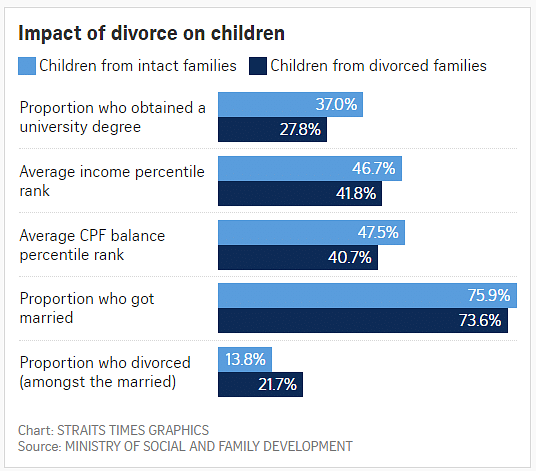Divorce inflicts long-lasting toll on children: MSF study
Data shows those whose parents split before they turned 21 earn less than peers
Sign up now: Get ST's newsletters delivered to your inbox

The study found that the children face long-term "divorce penalties" or disadvantages brought about by their parents' marital split.
PHOTO: ST FILE
A landmark study examining the marital and economic records of more than 100,000 Singaporeans found that their parents' divorce inflicted a long-lasting toll on key areas of their lives.
At age 35, these adult children whose parents divorced before they turned 21 earned less than their peers whose parents stayed together, and they themselves were more likely to get divorced, according to the Ministry of Social and Family Development (MSF) study.
The first local study of its kind, titled Inter-generational Effects of Divorce on Children in Singapore, found they face long-term "divorce penalties" or disadvantages brought about by their parents' marital split.
The study, released yesterday, found that:
• Children from divorced families were less likely to obtain a university degree. Only 27.8 per cent of these children were university graduates, compared with 37 per cent of children from intact families.
• Children whose parents divorced earned less than their peers whose parents stayed married, and these children had smaller sums in their Central Provident Fund accounts. For example, the average income percentile rank of children from divorced families was 41.8, lower than the 46.7 for children whose parents stayed together. The higher the income, the higher the percentile rank.
• Children whose parents went their separate ways were also less likely to get married, with 73.6 per cent of them tying the knot by the time they turned 35. This is compared with 75.9 per cent for children from intact families.
• Children whose parents were divorced were more likely to be divorced themselves, with 21.7 per cent ending their marriages by the time they turned 35. This is compared with 13.8 per cent for children whose parents stayed wed.
An MSF spokesman said the differences in the two groups of children were statistically significant.
The study examined the economic and marriage outcomes of 101,180 Singaporean children born between 1979 and 1981 and was based on aggregated data from multiple sources of administrative and survey records.
The Department of Statistics and MSF conducted the study.
Researchers found that the parents of 8.8 per cent, or 8,880 people, divorced before the child had celebrated his or her 21st birthday.
To ensure that the study was comparing families of similar backgrounds, apart from the parents' marital status, children from divorced families were matched with those whose parents remained married on a range of demographic characteristics, such as their parents' ages and their highest qualification at the point of marriage.
The study comes as the number of divorces has inched up, with 7,330 divorces last year, up from 6,990 in 2018.
Some 55 per cent of divorces last year involved couples with at least one child under 21.

Minister for Social and Family Development Masagos Zulkifli said in the study's media statement: "With this landmark study, we now know that the effects of divorce on a child are not temporary, and impact the child's future, his education and his family when he marries. This is why post-divorce, positive co-parenting is so important."
Sociologists and counsellors interviewed suggested a few factors in divorce that affected children negatively.
Singapore Management University sociologist Paulin Straughan said: "With every marriage dissolution, there is a high likelihood that the well-being of the family unit (in terms of financial, social and emotional assets) is reduced."
The often long-drawn tensions in the family, coupled with reduced financial and emotional resources as a result of the divorce, affect the child in different ways, from doing well in school to managing relationships and conflicts, she added.
Professor Jean Yeung, founding director of the Centre for Family and Population Research at the National University of Singapore, cautioned that it cannot be concluded from the study that divorce causes worse outcomes for children.
This is because there are many other variables that cause both the divorce and the children to fare worse that cannot be precluded.
These variables could include personal circumstances and characteristics that lead to greater stress within the family, for example, leading to the divorce and also the child's lower academic and other achievements.
Prof Yeung explained: "Hence, the lower achievement of the child is not caused by the divorce, though it may be exacerbated by the divorce."
The study stated as much, saying: "While the results might not strictly inform us of the causal impact of divorce, they provide an indicative sense of children's long-term outcomes associated with parental divorce, which would in turn help inform interventions for children when couples file for divorce."
The Institute of Policy Studies' senior research fellow Mathew Mathews noted that not every child who comes from a divorced family is affected in the same way.
He said: "The availability of adequate support - perhaps from the extended family and community - can mediate the extent of negative effects that children experience post-divorce."
The report said that to mitigate the negative impact of divorces, efforts to help couples build strong marriages and interventions to help children adjust to life after their parents' divorce are important.
The MSF and its community partners run a suite of services, from marriage preparation programmes to help couples prepare for their lives together to six divorce support agencies providing specialised help to couples going their separate ways.


